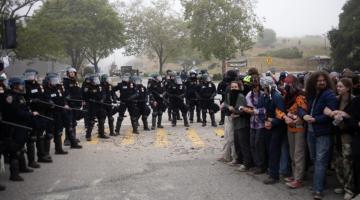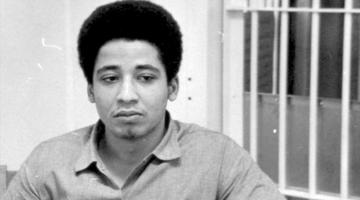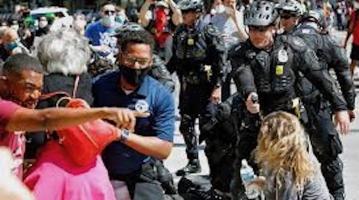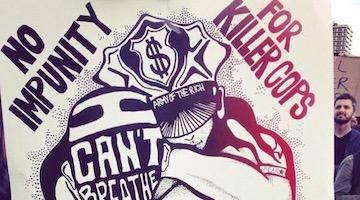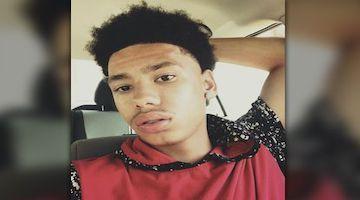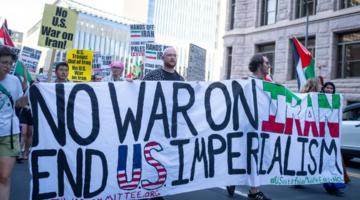More Surveillance Won’t Stop White Supremacy -- It Will Target Activists of Color
Violence from people of color and other marginalized groups – or even simply fear of such violence -- is dealt with immediately and with the harshest of consequences.
“The FBI umbrella term ‘racially motivated violent extremist’ lumps Black and other organizers of color with white nationalists.”
For mainstream lawmakers, the January 6 attack was a wake-up call to a simmering threat. No longer able to pretend white nationalist violence is a fringe remnant of a bygone era, some elected officials have drawn attention to law enforcement’s negligence to prevent the violence at the Capitol and are calling for new approaches.
However, some of their calls to action point toward old approaches that have only entrenched the forces of white supremacy: domestic terrorism laws. In the immediate aftermath of the January 6 attack, President Joe Biden expressed support for a domestic terrorism law. Brian O’Hare, the president of the FBI Agents Association, called on Congress to make domestic terrorism a federal crime. In a February USA Today op-ed, O’Hare said such a new law would criminalize acts of political violence that run counter to the constitution. But opponents of creating new laws point to existing criminal statutes often overlooked by law enforcement.
Calls for new domestic terrorism laws raise numerous concerns for Black communities and other communities of color. While treated as a distant dark history, the surveillance and scrutiny of our communities leads to more than a healthy skepticism of local and federal law enforcement.
“Calls for new domestic terrorism laws raise numerous concerns for Black communities and other communities of color.”
“White nationalist violence has been at the root of this country since its inception,” Maha Hilal, co-director of the Justice for Muslims Collective, told Truthout. The collective organizes to dismantle institutionalized Islamophobia and the long-term impacts of the war on terror.
“It is abhorrent that after all this time the only intervention that the government has been willing to consider — domestic terrorism charges — is one that will end up hurting Black and Brown communities,” Hilal continued. “This fact demonstrates a lack of willingness on the part of the government to actually confront white nationalist violence on its own and stands in stark contrast to how violence from marginalized groups is dealt with immediately and with the harshest of consequences.”
While reports have shown the rising threat of white nationalist violence for years, the focus of law enforcement’s attention to popular movements has often centered on Black activists and other activists of color.
During a press conference held by MediaJustice and partner organizations, Rep. Rashida Tlaib (D-Michigan) said the priority should not be on expanding national security powers at the expense of human and civil rights, as this step would undermine an already fragile democracy.
“The intelligence failure that allowed the capitol siege to occur was not the result of insufficient national security or surveillance powers,” said Tlaib. “If our government and the previous administration had focused more on the threat of white nationalist terrorism, and less on harassing Black Lives Matter, civil rights and left-wing protesters, they would have seen this coming a mile away and taken action to prevent it.”
During a panel discussion, Adjoa Aiyetoro of the Black and Brown Activism Defense Collective said that any useful response to the January 6 attack will require a historical grounding. Aiyetoro said the attack was devastating, but people needed to stop treating it as a special incident.
“The difference in treatment of white nationalists and Black and Brown people is historic,” said Aiyetoro. “Black and Brown people have always been the targets. They were the others. And we continue to be other[ed] even though we’ve had civil rights laws and [other laws passed].”
“If our government and the previous administration had focused more on the threat of white nationalist terrorism, and less on harassing Black Lives Matter, civil rights and left-wing protesters, they would have seen this coming a mile away.”
The impacts of surveillance on targeted communities are often lost in mainstream debates on the issue. Although current and former FBI officials and legal experts recount the FBI’s history of COINTELPRO under J. Edgar Hoover as an example of how surveillance can go “wrong,” they often gloss over the continuation of various forms of domestic surveillance.
A few years ago, leaked documents showed the FBI engaging in a familiar pattern of targeting Black activism as “extremism,” justifying surveillance and investigation into Black organizing around police killings. In 2017, an FBI intelligence assessment claimed that “Black Identity Extremists” were a growing threat and motivated to kill law enforcement. Various civil rights organizations, including Media Justice and the ACLU, demanded the FBI explain not only the use of the term but reveal which individuals and groups were being targeted. The groups sued in 2019 to compel compliance with previously submitted freedom of information act (FOIA) requests. After national backlash, the FBI claimed to stop using the term in mid-2019. Instead, the agency began using the umbrella term “racially motivated violent extremist,” lumping in Black and other organizers of color with white nationalists.
In June 2020, in the middle of racial justice uprisings across the country, Media Justice and partner organizations discovered that the FBI continued using the “Black Identity Extremist” label internally. Black self-determination has been treated as a national security threat since the country’s inception. Similar concerns have been raised by Muslim communities, particularly after 9/11. Indigenous advocates and communities have also challenged targeted surveillance and other tactics such as efforts during the Standing Rock protests.
“Black self-determination has been treated as a national security threat since the country’s inception.”
No one should be shocked at the presence of white supremacists within law enforcement and the military, activists say. They are not lone-wolf “terrorists;” rather, white supremacy is part of the institutions of policing and the military themselves.
Meanwhile, the language of terrorism has become a rhetorical device that justifies brutal acts — from using facial recognition software to drone strikes on civilians — under the guise of “protecting America.”
“There’s a real fear in the word ‘terrorism’ as instrumentalized by our political leaders,” shared Sijal Nasralla of MPower Change during the panel. “It’s a term that has been used to harm us. And then I think that it has been used to profile, to harm us, [and] to wage wars on majority Muslim countries … to vindicate that kind of violence.”
The uprisings that took place across the country after the murders of George Floyd and Breonna Taylor added a new layer of concern about local and federal law enforcement surveillance and targeting of Black activists and others committed to racial justice.
The Trump administration labeled racial justice and opposition to white supremacy as threats. As white supremacists are classified as “racially motivated violent extremists,” activists question whether the same classification will be used to target those working for racial justice. The terms may have changed but concerns continue as to how Black and other communities of color are being characterized, tracked and targeted in pursuit of so-called safety and security.
Dissent by people of color is often labeled anti-American and prioritized for targeting by police and carceral systems while white nationalism is often ignored (or even endorsed) by the authorities even when it is publicly recognized as a threat. Having a system built on white supremacy allows for government agencies to conflate the righteous rage of oppressed people with white entitlement and anger.
“White supremacy is part of the institutions of policing and the military themselves.”
This is also seen in the renewed focus on anti-protest bills in multiple state houses across the country. “There have been over 50 anti-protest bills introduced since the insurrection in what seems to be an effort by legislators to capitalize on the chaos and advance proposals that increase penalties and create new criminal sanctions for protesters,” Nora Benavidez told Truthout. As the director of U.S. Free Expression Programs for Pen America, Benavidez has studied the increasing criminalization of dissent studying response to racial justice over the past several years.
Benavidez says state legislatures fail to address the growing threat of white supremacy and white nationalist violence, instead opting for false equivalencies between the Capitol attack and racial justice protests. The same misleading narrative is seen in the continued use of racially motivated extremism as a single category to regulate without any discernment in the difference between groups. “This narrative is misleading,” continued Benavidez, saying it “conflates an extremist power grab with a BIPOC-led protest movement for social change.
Some say sunlight is the best disinfectant, yet when government abuses carried out under the guise of surveillance and security are exposed, they’re often characterized as isolated occurrences. However, across jurisdictions, mass surveillance continues to disproportionately impact marginalized communities and those advancing justice and equity.
Efforts to address safety and security must address white supremacy and systemic racism ingrained in law enforcement institutions at all levels of government. The problem of combatting white supremacist violence cannot be solved through the existing law enforcement apparatus, and require exploring partnerships with grassroots movement-based organizations like the BREATHE Act. Simply acting to implement “anti-terrorism” laws without considering the prevalence of harm caused to Black and other people of color by surveillance programs will only continue to exacerbate the problem.
“If the government is truly interested in addressing white nationalist violence, then they must develop measures of accountability that don’t result in the targeting and scapegoating of BIPOC communities,” said Hilal.
Anoa Changa is a movement journalist that is deeply influenced by grassroots-led electoral organizing efforts. Anoa hosts the Scalawag Magazine video series “As the South Votes” and “The Way with Anoa Podcast.” An organizer by nature and retired attorney, Anoa has a strong sense of equity and justice.
This article previously appeared in Truthout.
COMMENTS?
Please join the conversation on Black Agenda Report's Facebook page at http://facebook.com/blackagendareport
Or, you can comment by emailing us at comments@blackagendareport.com



